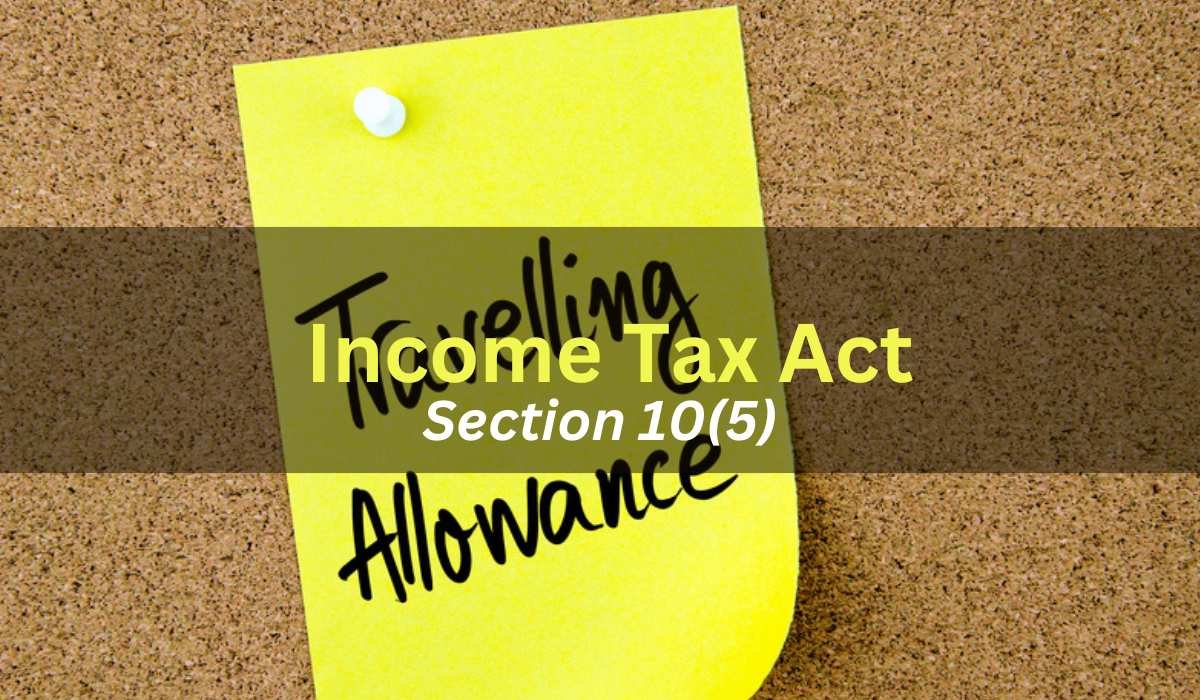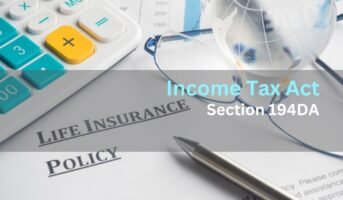Leave Travel Allowance (LTA)/Leave Travel Concession (LTC) is an exemption granted to the salaried class under Section 10(5) of the Income Tax Act. When an employee retires or is let go from their job, the LTA they receive from their previous company is exempt from taxation.
See also: What is Income Tax Form 10E?
Types of allowances covered under Section 10(5)
Leave travel allowance refers to the sum a company gives an employee so that they may travel in India with or without their family. This reimbursement is only for the cost of using public transportation such as an airplane, trains or buses. LTA does not cover incidental costs such as lodging, food and entertainment.
Under Section 10(5) and Rule 2B of the Income Tax Regulations, the sum received as LTA is exempt from income tax under specific situations.
For the assessment year starting April 1, 2021, Section 10(5) is revised to state that subject to the fulfilment of specified requirements, the value instead of any travel concession or assistance received by, or due to, a person shall likewise be excluded under this section.
All about: Section 10 26 of income tax act
Eligibility to claim benefits under Section 10(5)
An employee’s leave trip is not taxable under Section 10(5). Employees of any nationality (Indian or elsewhere) are eligible for this deduction. The following are the terms of this section:
- If an employee or person wants to take a trip within the current fiscal year, they must first get a travel subsidy from their current company.
- It must be delivered to the prospective or current employer in conjunction with the employee’s upcoming trip.
When an employee is on leave in any part of India, they are entitled to a receive travel allowance from their company.
Section 10(5) of Income Tax Act: Eligibility
- The exemption is only available for actual travel.
- Only trips inside India, known as domestic travel, are eligible for exemption. LTA does not cover trips outside of the country.
- To qualify for the travel exemption, either the employee or his immediate family (spouse, children, and fully or mostly dependent parents, siblings, etc.) must be on the trip with them. In addition, no more than two of an employee’s children born on or after October 1, 1998, are eligible for this exemption. For children born before October 1, 1998, there are no age limits. This limitation also does not apply to subsequent multiple births following a single birth.
Section 10(5) of Income Tax Act: Dispensing LTA for eligible individuals
The exclusion applies solely to the employee’s real transportation expenditures, such as airfare, train, or bus fare. The exemption does not apply to incidental costs like taxis, admissions, hotel stays, meals, etc. All LTA expenses paid for by an employer are excluded as well.
If an employee is qualified for an LTA of Rs 30,000 but actually incurs Rs 20,000 in permissible travel expenses, only Rs 20,000 of the LTA will be excluded from taxation; the remaining Rs 10,000 would be considered pay income.
Only two trips made during a consecutive four-year period qualify for an LTA exemption. If an employee has not taken use of the exemption for one or two trips in any of the years in a 4-year block, they may do so in the first calendar year of the following block.
Section 10(5) deduction cap
- No concession under this provision should exceed the cost of providing the concession.
- Travel via the most direct and least expensive flight on a national airline. If you need to split up your trip, you will have to pay the same amount as you would for a straight flight.
- Travel comfortably on a first-class train using the most direct route possible.
- On a bus or any other transport, it is a first-class AC train fare via the shortest route to the destination if the origin and destination of the travel are linked by rail and the journey is made by any mode other than air.
- You may have to drive if your starting point and final destination (or at least some of it) are not linked by train.
Section 10(5): How to request an LTA?
The process for requesting an LTA is usually determined by the company itself. In addition to the required statement, workers may be asked to present documentation of their journey, such as tickets, boarding passes, invoices from the travel agency, etc., within the deadline set by the employer.
It is not required by law for employers to request documentation of business travel, but it is prudent for workers to do so for their own records and to provide copies to their companies in accordance with their LTA policies or as required by tax authorities.
FAQs
What is Leave Travel Allowance (LTA)?
LTA is an allowance provided by employers to employees to cover their travel expenses when they go on leave and travel with their family. It is part of an employee's overall salary package.
Who is eligible for LTA?
Employees who are on the company's payroll and have completed a certain period of service are generally eligible for LTA. The exact eligibility criteria may vary from one company to another.
What expenses are covered under LTA?
LTA typically covers expenses related to travel, such as airfare, train fare, bus fare or other transportation costs.
Can I claim LTA for international travel?
No, LTA is specifically meant for domestic travel within India. International travel expenses are not covered under LTA.
Can I claim LTA for my entire family?
LTA can usually be claimed for the employee, their spouse, children and dependent parents.
Is there a limit on the amount that can be claimed under LTA?
Yes, there is a limit on the amount that can be claimed as LTA.
Is LTA taxable?
LTA is eligible for tax exemption under certain conditions. The exemption is available for the fare component of the travel expenses. However, the exemption is subject to certain rules and conditions specified by the income tax authorities.
How do I claim LTA?
Employees need to submit proof of travel expenses such as travel tickets and other relevant documents to their employer to claim LTA. Many companies have specific procedures and forms for LTA claims.
What is Rule 2B of Section 10(5)?
Taxes are paid on wages and salaries when an employee is on leave; their company may pay them to travel inside the nation for business or pleasure.
Is evidence of LTA required?
The company itself usually determines the process for requesting an LTA. Employees may be expected to submit further proof of their trip, such as tickets, boarding cards, invoices from the travel agency, etc.
| Got any questions or point of view on our article? We would love to hear from you. Write to our Editor-in-Chief Jhumur Ghosh at [email protected] |

An alumna of the Indian Institute of Mass Communication, Dhenkanal, Sunita Mishra brings over 16 years of expertise to the fields of legal matters, financial insights, and property market trends. Recognised for her ability to elucidate complex topics, her articles serve as a go-to resource for home buyers navigating intricate subjects. Through her extensive career, she has been associated with esteemed organisations like the Financial Express, Hindustan Times, Network18, All India Radio, and Business Standard.
In addition to her professional accomplishments, Sunita holds an MA degree in Sanskrit, with a specialisation in Indian Philosophy, from Delhi University. Outside of her work schedule, she likes to unwind by practising Yoga, and pursues her passion for travel.
[email protected]











